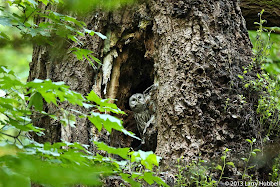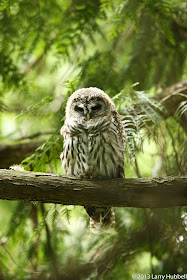As global warming and climate change drive other creatures to extinction the Barred Owl will go where the hunting is good. They will live in your local park or in an old growth forest. Unlike the Spotted Owl they are not endangered, except by our efforts to save the Spotted Owl. Barred Owls are survivors.
The bird on the left is a fledgling that hatched this year, notice the soft white "peach-fuzz". The adult bird, on the right, is one of its parents. The adult Barred Owl has vertical stripes on its chest while the adult Spotted Owl has horizontal bands. You can see the difference here.
The birds in today's post are from the Arboretum and Interlaken Parks.
One might assume this is a small, young owl peeking out of a nesting hole, however this is actually an adult owl protecting a nesting site in a very large tree.
A huge, Thank You! to Dan Reiff for helping to educate me about the Barred Owls and their behavior. One of the many things he pointed out is that the Barred Owls become active just after sunset.
This young bird, undisturbed by our presence, is waiting for its parents to bring it food.
The young bird is very observant...
...when the adult lands with a tasty snack.
The exchange is carried out without mishap...
...at least for the owls.
This took place early in the summer and since then this young owl and others like it have been developing and refining their hunting skills.
Owls have a number of special abilities and techniques that enable their superior hunting skills. For one thing their flight is virtually silent. Part of how they accomplish this has to do with the way the edges of their wing feathers are not all the same length. This "mixes up" of the air and apparently cancels out a lot of the sound.
Some of the newer jet engines now have scallops around the trailing edges of their engines which also helps to reduce noise. According to an Boeing engineer these edges are sometimes call Turkey Feathers. It seems like Owl Feathers might be a more appropriate description. More information here.
Another technique owls use to hunt is moving their heads to triangulate and determine the precise location of the prey.
All owls do this but the young birds seem to spend a lot of time practicing this technique.
During daylight hours the owls generally find a place to rest. They seem to alternate between having both eyes closed....
...one eye closed...
...or both eyes open if an interesting meal happens to be passing by.
Sometimes, just like you and I, they simply cannot suppress a yawn.
Did you yawn yet? :-)
They also spend time grooming their feathers.
But ultimately they use their superior vision and hearing to hunt at night and they spend their days sleeping peacefully on a branch just above your head.
So as you visit the parks around Union Bay be sure to glance up and look for the sleeping Barred Owls. As Dan pointed out they seem to prefer the more horizontal branches. May be it is hard to sleep when you are off balance.
Have a great day on Union Bay...where nature lives in the city!
Larry























Very fun, thank you.
ReplyDeleteWings,
Jane
You are welcome! :-)
DeleteLarry, You take incredible pictures and I eagerly anticipate your next post. Thank you for the time you put into this amazing blog.
ReplyDelete~Karyl
Thank you! It is kind of funny that I actually enjoy the process of finding and watching birds and nature so much that the photos feel almost like a bonus. One friend described being out in nature as meditation, another talked of the healing value. It is both of those for me plus a deep feeling of peace, a sense of being where I belong. It teaches one the value and love of a place. With our planes, trains and cars we are always trying to be somewhere else where we will be happy, but the irony is we don't need to go anywhere. I find happiness and peace come from stopping and observing the wonders of nature that have surrounded me all along, but I was previously too busy to look. Why?
Delete